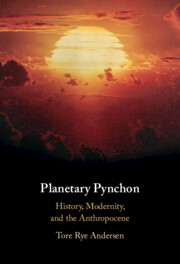Refine search
Actions for selected content:
3 results

Planetary Pynchon
- History, Modernity, and the Anthropocene
-
- Published online:
- 24 August 2023
- Print publication:
- 24 August 2023
Chapter 6 - Planetary Pynchon
-
- Book:
- Planetary Pynchon
- Published online:
- 24 August 2023
- Print publication:
- 24 August 2023, pp 156-191
-
- Chapter
- Export citation
Chapter 4 - Gravity’s Rainbow
-
- Book:
- Planetary Pynchon
- Published online:
- 24 August 2023
- Print publication:
- 24 August 2023, pp 94-128
-
- Chapter
- Export citation
